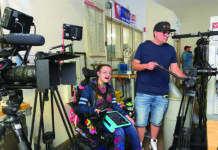From 2019 to 2021, 37 cases of Forcible Sex Offenses (both rape and fondling) were reported on the main campus of Colorado Mesa University (CMU).
Currently, 2022 and 2023 data are not available. However, this does not encompass unreported crimes. According to a report from the Pennsylvania Coalition Against Rape (PCAR), 90% of sexual assault goes unreported on campuses in the United States.
The same PCAR report cites that one in every five women and one in 16 men are sexually assaulted, with LGBTQ+, disabled and Black students being more susceptible.
CMU has taken preventative measures on campus, specifically through the Real Talk: Sexuality and Genders series. February is Sexual Assault Awareness month and the organization is holding events to teach students how to recognize red flags in relationships and communicate clearly from both perspectives.
“Sexual assault doesn’t necessarily happen with strangers, a lot of times it’s someone you know. We want everyone to be watching for red flags,” CMU Title IX Coordinator Stephanie Rubenstein said. “Then, we provide information for all students about what consent looks like, and we want to make sure that people are aware of communication skills in sexual encounters, which is not something that’s taught very often in high schools or any sex ed.”
Rubenstein also works with Resident Assistants and Greek Life to provide consent and recognition training. The Genders and Sexualities Alliance further this message to other students through events and social media campaigns centered around education.
Moreover, students who experience or witness sexual assault have a couple of different options to report or take action on the incident. In MAVzone, there is a “Concerns” button on the home screen that allows anonymous reports to be made. It is important to note, that if no names are attached, there cannot be any action taken.
“I tell everyone that when you report something to me, or when you come to me, it goes no further than that, unless you want it to. The victim is in the driver’s seat, I want to give them their power back. I can also help if they want to go to law enforcement. There are great victim services here within the community: with the police department, with the sheriff’s department and with the district attorney’s office,” Rubenstein said.
There is the option to leave law enforcement out of the process and only go through CMU. In this case, the victim would have the option to go to a “trial” where they would testify. The people involved would be in separate rooms with no chance of running into each other and the victim only would have to tell their story once. The goal of this is to make it as easy as possible for victims to get the kind of justice that they desire.
Suppose an assault occurs and the victim does not want to move forward with a police or school investigation. In that case, they have the option under Title IX to free therapy or other mental health services that can be coordinated through Rubenstein or her colleagues.
Students can find reporting information and protocols by looking up “Sexual Assault Response Team” or “Title IX” on the CMU website.




